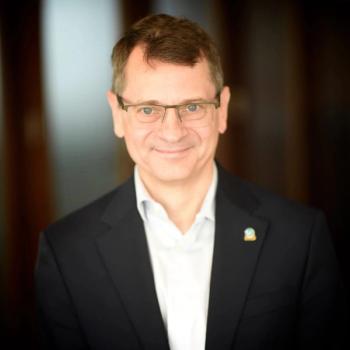
- Psychiatric Times Vol 14 No 5
- Volume 14
- Issue 5
Outreach Program Aids Homeless Mentally Ill
Project for Psychiatric Outreach to the Homeless Inc. (PPOH) is an award-winning program through which volunteer psychiatrists help agencies treat the homeless mentally ill started by psychiatrist Katherine Falk, M.D. "Up to this point I could walk by people living in cardboard or over gratings, shrug my shoulders and say 'at least they get taken to Bellevue,'" Falk recalled. "But what I found out is... they weren't taken to Bellevue or anywhere else."
On a hot September evening in 1985, Katherine Falk, M.D., a Manhattan psychiatrist who had been in private practice for a decade, saw a man wearing nothing but an undershirt sitting on the sidewalk at 55th Street and Lexington Avenue. She called the police and asked that he be taken to Bellevue City Hospital. The police refused to do anything.
Two weeks later, she called a different police precinct about an obviously psychotic man who was playing a broken guitar connected to two large speakers outside her office on Lexington Avenue and 88th Street. This time, the policeman said he'd send a squad car right over, but when Falk asked what would be done with the man, she was told he'd be "shooed into someone else's neighborhood."
This, she told the Psychiatric Times this month, is when her "bubble of complacency" burst. This, she said, was the impetus that led her to start a task force which would become the Project for Psychiatric Outreach to the Homeless Inc. (PPOH), an award-winning program through which volunteer psychiatrists help agencies treat the homeless mentally ill.
"Up to this point I could walk by people living in cardboard or over gratings, shrug my shoulders and say 'at least they get taken to Bellevue,'" Falk recalled. "But what I found out from those two phone calls is that at that time they weren't taken to Bellevue or anywhere else."
In a "very long and very friendly" conversation with that second policeman, Falk learned that when police took such persons to hospitals, they either weren't admitted, or were admitted only to return quickly to the same street corner in the same condition. For the police, this meant a lot of tedious paperwork for no real results.
Shaken by these revelations, Falk called around to find out just what was available for mentally ill homeless people in New York City, discovering that while there were quite a few community agencies mandated to serve this population, few were funded for psychiatrists.
"The caseworkers and social workers were expected to make use of emergency rooms and clinics to get their people treated," said Falk. "This didn't work because people this ill who are homeless can't make use of traditional places of treatment."Falk said that before getting this information, she'd realized the homeless problem was worsening and considered volunteering in a soup kitchen.
"Now it occurred to me that as a psychiatrist, I had the training to do more than serve soup," she said. "Serving soup is fine, but I actually knew what to do to treat these people, and then it occurred to me I could get other psychiatrists to do it also."That fall, she sent a proposal to the New York County District Branch of the American Psychiatric Association. The proposal was approved and the Task Force on Voluntary Services to the Homeless was formed.
"I wanted to do it through the APA because I had the feeling that while nobody would necessarily open mail coming from me, they'd likely open mail from their professional organizations," Falk said.
In April 1986, the task force sent recruitment letters to the membership of the APA's New York County District Branch. By June, the program was up and running with seven volunteer psychiatrists at three sites.
In 1989, Gail Albert, Ph.D., who had worked with the project since its beginning, was hired as program director. And in 1991, because the program outgrew the scope and limitations of an APA task force, it was incorporated as an independent not-for-profit organization, with Albert assuming the role of full-time executive director and Falk staying on as a volunteer and later becoming part-time paid medical director.
Today, the program has 45 volunteer psychiatrists at 27 sites, with a waiting list of 20 sites and "many more places that would like to use us that we can't even put on our waiting list," Falk said. PPOH is now funded primarily by a contract with New York City's Department of Mental Health and a three-year grant from the U.S. Department of Housing and Urban Development (HUD), plus a variety of foundation grants and personal contributions, Falk added.
According to recent PPOH statistics, the program's volunteer psychiatrists have treated more than 5,000 homeless people with chronic and severe mental illness, donating more than $2 million in pro bono services. About 1,000 clients were seen just last year.
The volunteers give the free psychiatric care-including diagnoses, assessments, treatment planning, medication, individual therapy, group psychotherapy and follow-up care-at drop-in centers, day programs, shelters, soup kitchens and temporary and permanent residences which have no other source of on-site, nonemergency psychiatry. Each psychiatrist donates one to four hours a week, always at the same facility. In addition to direct services, PPOH volunteers provide in-service training to agency staff, and ongoing psychological support to help staff deal with the stress and anxiety of their work.
"This has become a particularly important piece of our program," said Albert. "The caseworkers are intensely grateful because they're working with the most difficult people and they generally have no formal training to do this work. They're very eager to improve their skills."
Another increasingly important component of PPOH is its orientation and continuing education for the volunteer psychiatrists, plus its didactic and clinical training program for psychiatry residents and fellows taking clinical electives with PPOH.
"We noticed that as new programs were funded, they were often funded for at least a part-time psychiatrist," Albert said. "But they were having a very hard time finding psychiatrists they wanted to hire, so for the past three years we've been doing an enormous and increasing amount of training, actually paying hospitals to release residents during the day to take formal electives through us."
Currently, PPOH works with departments of psychiatry at six Manhattan hospitals, including Mt. Sinai Medical Center, Bellevue/New York University Center, New York State Psychiatric Institute, Harlem Hospital Center, New York Hospital-Cornell Medical Center and Beth Israel Medical Center. Negotiations are underway with more institutions in Brooklyn and the Bronx.
"We've really changed our thinking to try to help shift the system of care," said Albert, adding that of the 42 residents who have already done electives with PPOH and finished their residency training, 28 have remained in public psychiatry, at least on a part-time basis. Another 15 to 20 residents will take electives just this year. "The training is a way of providing a pool of psychiatrists who are trained to do this work and who really want to do this work for the future. It's an extraordinary incentive for recruitment into this field."
And the field will only increase, Albert said."The hospitals see our work as an enormous opportunity for them as well, because they see more and more that most of community psychiatry is going to be at agencies like this, and we're really providing a model of treatment and training for how to do it there. Also, the training is invaluable for those psychiatrists who do stay in hospital settings. So what we're doing is creating a real network of people who know how to work together."
Falk and Albert also coauthored a training manual called "Treating the Mentally Ill Homeless: Handbook for Psychiatrists." Funded by the American Express Philanthropic Program and the Norman Foundation, the manual has been distributed to psychiatrists, social workers and agencies interested in doing this work all over the United States.But for those trying to start similar programs in other cities, recruitment of volunteer psychiatrists has been difficult.Said Albert: "Last year, we helped a wonderful program, called Caduceus Outreach Services, get started in San Francisco. But that program has had a very hard time getting volunteers, and other proposed programs which we've consulted with have never gotten off the ground."
So why is it so difficult to get volunteers?"It's extraordinarily difficult to convince psychiatrists that this work is satisfying, incredibly gratifying and even fun," Albert said. "But the truth is that psychiatrists doing this get even more than they give. This isn't just some missionary endeavor."Stephen Goldfinger, M.D., chairperson of the APA's Committee on Poverty, Homelessness and Psychiatric Disorders, called PPOH the most "thoughtful, comprehensive and well-designed" such program in the country.
"Dr. Falk's program is virtually unique in America," he said. "It provides an invaluable service to many individuals who would otherwise receive less professional care."Still, he questions a society in which volunteers must provide needed services.
"In a more caring society, programs like this would be well-funded and decent care would be a right for all," he said. Falk said she agrees "in principle" that such treatment should be automatically provided within the system.
"But if government doesn't do it, and this one certainly isn't, those of us who can do it have an obligation to step in," she said. "So what we're trying to do by volunteering is to show that this kind of treatment is needed, that psychiatrists are needed to do it, that it's fun and rewarding to do it, and that people get better when you do it."
Falk said that the first message of PPOH is that treatment for the mentally ill homeless must be done on-site."Whether it's an outreach program, a drop-in center, a shelter or a permanent residence, the work must be done there," Falk said. "That's because for people with serious mental illness and homelessness, there can be an enormous denial of illness. And even if they do think they have something wrong, they have other pressing needs, so treatment of mental illness doesn't even make it onto their list, or is at the bottom of their list."But by having psychiatrist providers on a site where the mentally ill homeless will go for other things they want, such as showers and food, treatment can be given "without it's looking like treatment," Falk said.
"And that's the second message-that treatment has to be done in a nontraditional way, with creativity, flexibility and enormous gentleness and acceptance, and rarely in an office behind a desk," Falk said. "The relationship is a very different one from traditional settings where clients call for appointments, thereby already identifying themselves as patients."
And in the context of unified services with excellent social services back-up, psychiatry does work, stressed Falk. "People aren't going to get better being handed a few pills on Broadway," she said. "But when you give state-of-the-art treatment in a coordinated fashion with agency staff, it's remarkable how people change. And what we've also seen is that after people get into permanent housing, the degree of rehabilitation that's possible is far beyond what I ever imagined."
In fact, said Falk, when mentally ill people with chronic mental illness who've had many years of homelessness are given the proper services and rehabilitative effort, they rarely return to the streets.
"When you're talking about drugs and alcohol, that's another situation," she said. "But when chronic mentally ill persons are appropriately treated and referred to permanent supportive housing which has all the services on-site, including psychiatric care, there is virtually zero loss. Sure, people relapse and get rehospitalized, but their beds are saved and they come back. And other times, the crisis can be managed at the residence, without the need for hospitalization."
This year, with the help of the three-year HUD grant which was given specifically to double the size of the program and expand it outside of Manhattan into a city-wide agency, a focus is again on recruitment. In April and May, PPOH will send two recruitment postcards and a brochure to psychiatrists belonging to APA district branches in Brooklyn and the Bronx, as well as to members of the American Psychoanalytic Association, the New York Psychoanalytic Institute and the American Association of Community Psychiatrists.
Both postcards picture a homeless man sorting through garbage. One postcard reads: "Shrink the Homeless Population." The other features a Margaret Mead quote: "Never doubt that a small group of thoughtful committed citizens can change the world; indeed it's the only thing that ever has."
Articles in this issue
almost 29 years ago
Investing: It's All About Making Your Money Workalmost 29 years ago
Commentary: A Telling Momentalmost 29 years ago
Consultation Services Help Psychiatrists SurviveNewsletter
Receive trusted psychiatric news, expert analysis, and clinical insights — subscribe today to support your practice and your patients.






